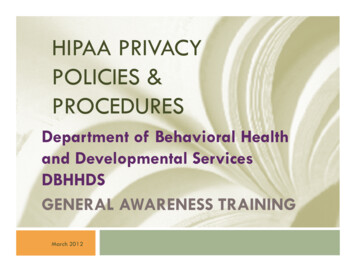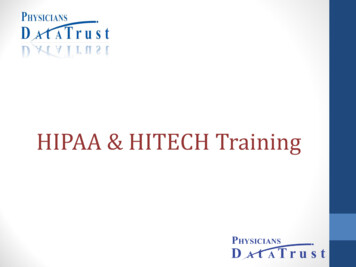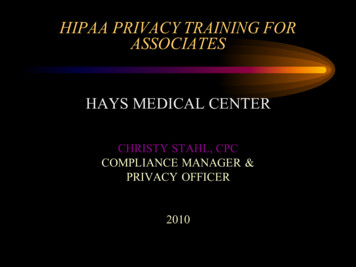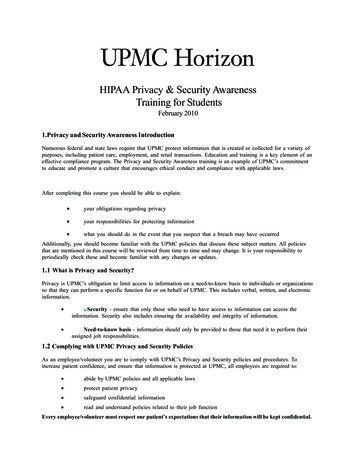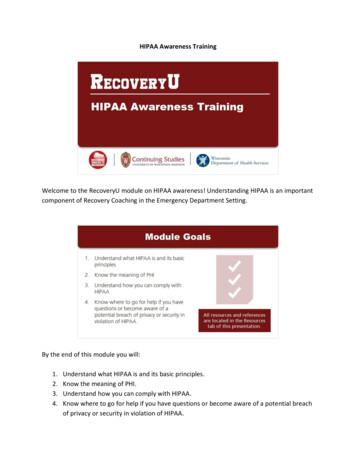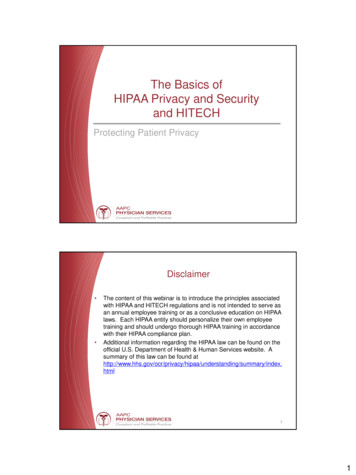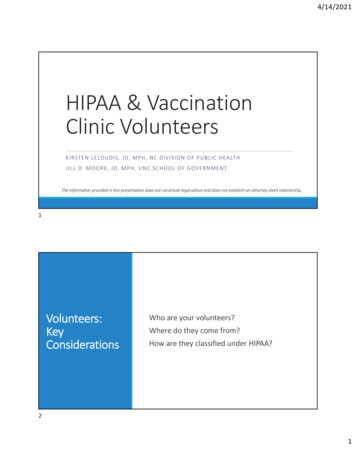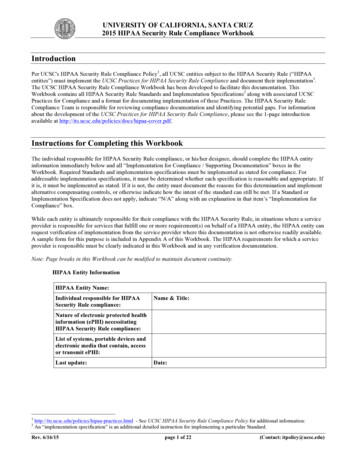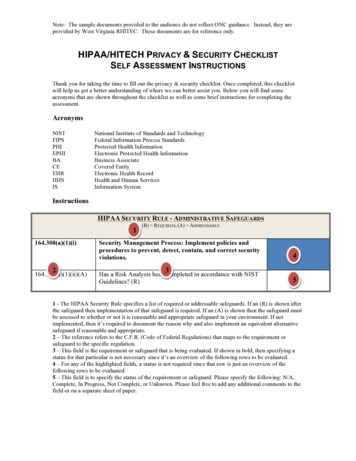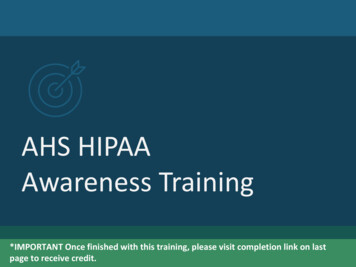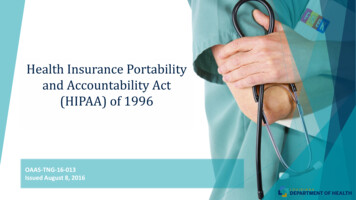
Transcription
Prophecy Predicting Employee SuccessHIPAAHealth Insurance Portability andAccountability ActHIPAA . . HI: 11. HIPAA . HI: 1A. Overview. HI: 1B. Who should comply with HIPAA?. .HI: 1C. What is PHI? . . .HI: 2D. The Privacy Rule .HI: 4E. The Security Rule . . .HI: 4F. How can I protect PHI?. . .HI: 5G. PHI Access & Disclosure . . .HI: 5H. Who are Business Associates . .HI: 6I. Security Rule Expanded. . .HI: 6J. Electronic Health Records (EHR) and e-PHI .HI: 7K. What is a Breach in PHI? . . .HI: 7L. Penalties for Violations .HI: 8M. Recommendations for Caregivers . . .HI: 92. HITECH Act . .HI: 10A. What is the HITECH Act? . . HI: 10B. What is an EHR (Electronic Health Record)? . . . .HI: 10C. Impact of HITECH Act on Caregiver . .HI: 10Bibliography . .HI: 11 Copyright Clinical Assessments by Prophecy, a Division of Prophecy Healthcare, Inc.
HIPAA1. HIPAAA. OverviewHealthcare workers and organizations rely heavily on the sharing of patient information. As wecontinue the transition toward electronic sharing of patient health information, healthcare workers andorganizations understand that standards and technology must stay current to enable fast, secure andaccurate transmission of that information across the care continuum.As technology advances and patient information becomes more portable (easy to share), it becomesmore difficult to protect the privacy of patient health information. Therefore healthcare workers,organizations, and consumers are increasingly concerned about patient privacy.The Health Insurance Portability and Accountability Act of 1996 (HIPAA), Public Law 104-191, wasenacted on August 21, 1996. The Health Insurance Portability and Accountability Act of 1996,commonly known as HIPAA, was enacted to address these issues. HIPAA Standards establish a formatfor the fast and accurate exchange of health information data, and for maintaining the security of thatinformation. The Department of Health and Human Services published two rules under HIPAA, thePrivacy rule and the Security rule.B. Who should comply with HIPAA?All Covered Entities must comply with the HIPAA Privacy & Security Rules. A Covered Entityincludes: Healthcare provider who transmits data electronically (i.e.: doctors, hospitals, dentists, nursinghomes and pharmacies).***Under HIPAA, a healthcare provider is defined as any person or organization that furnishes,bills or is paid for health care services in the normal course of business and electronicallytransmits and stores that healthcare information. A healthcare provider can also include aperson or organization that engages a third party to process, transmit and store their claimselectronically. Health Plans Healthcare Clearinghouses Copyright Clinical Assessments by Prophecy, a Division of Prophecy Healthcare, Inc.HI: 1
C. What is PHI?As mentioned earlier, Protected Health Information or PHI is individually identifiable healthinformation or information that is linked to a patient. PHI concerns the health status, treatment, orpayment of a specific patient that is created or received and maintained by a covered entity.PHI does not include individually identifiable health information contained in education records and inemployment records held by a covered entity serving its role as an employer.Individually identifiable health information is health information that specifically identifies theindividual, or is information that could reasonably be expected to identify an individual, even if theindividual is not named.One Example of PHI:Mary Smith is the only 50-year-old patient with a diagnosis of lung cancer at XYZ Hospital.The following statement DOES NOT provide individually identifiable health information about MarySmith and is therefore NOT PHI: There are presently 7 persons with a diagnosis of lung cancer at XYZ Hospital.The following statement DOES provide individually identifiable health information: There is a 50-year-old woman with lung cancer at XYZ Hospital.Though the second statement does not mention Mary Smith by name, it is PHI because Mary Smith isthe only person who fits the description.Many different types of information could be used to identify an individual's PHI under the PrivacyRegulations, including but not limited to: Patient’s name Patient’s address Any elements of dates that are directly related to an individual, including birth date, admissiondate, discharge date, death date Telephone numbers, Fax numbers, Email addresses Social security numbers, Medical record numbers, Account numbers The individual's e-mail, URL, or ISP address Health plan beneficiary numbers (Insurance Numbers) Certificate/license numbers Vehicle identifiers and serial numbers, including license plate numbers Device identifiers and serial numbers Web Universal Resource Locators (URLs) Copyright Clinical Assessments by Prophecy, a Division of Prophecy Healthcare, Inc.HI: 2
Internet Protocol (IP) addresses Biometric identifiers, including finger and voice prints Full-face photographs and any comparable images Any other unique identifying number, characteristic, or codeInformation that meets the de-identified criteria would not be subject to the HIPAA Privacy Rule, as itwould not qualify as PHI.How should PHI be used and disclosed?The HIPAA Privacy Rule allows the use or disclosure of PHI: For treatment For payment For health care operations With authorization by the individual When required by lawThe HIPAA Privacy Rule protects the privacy of patient information. Any employee of a coveredentity who is involved in the gathering, storing, and transmission of patient information MUST complywith the HIPAA Privacy Rule. Failure to follow HIPAA regulations could result in punitive fines forhealthcare providers and/or individuals involved.Protected Health Information (PHI) can be used and disclosed without a signed or verbal authorizationfrom the patient when it is a necessary part of treatment, payment, or healthcare operations.The Privacy Rule generally requires covered entities to take reasonable steps to limit the use ordisclosure of, and requests for, protected health information to the minimum necessary to accomplishthe intended purpose.The minimum necessary standard does NOT apply to the following: Disclosures to or requests by a health care provider for treatment purposes (i.e.communication hand-offs). Disclosures to the individual who is the subject of the information (i.e. patient). Uses or disclosures made with a patient’s authorization. Uses or disclosures required for compliance with HIPAA Rules. Disclosures to HHS when disclosure of information is required under the Privacy Rule forenforcement purposes. Uses or disclosures that are required by other law. Copyright Clinical Assessments by Prophecy, a Division of Prophecy Healthcare, Inc.HI: 3
The Minimum Necessary Rule requires that only the information needed to get the job done beprovided. Healthcare organizations must obtain express permission or authorization from a patient forthe purpose of marketing, advertising and other purposes. Healthcare organizations must establishwritten privacy policies and procedures regarding protected health information. Caregivers shouldrefer to their hospitals health information policies and procedures regarding the use and disclosure ofPHI.D. The Privacy RuleUnder HIPAA, the Privacy Rule protects the privacy of all Protected Health Information (PHI). PHI isindividually identifiable health information that is gathered, stored, or transmitted on paper, orally, orby electronic or any other media.In general, HIPAA Privacy Rule requirements: Apply to most health care providers; Set a federal floor for protecting individually identifiable health information across all mediums(electronic, paper, and oral); Limit how covered entities may use and disclose individually identifiable health informationthey receive or create; Give individuals rights with respect to their PHI, including a right to examine and obtain a copyof information in their medical records and the right to ask covered entities to amend theirmedical record if information is inaccurate or incomplete; Impose administrative requirements for covered entities; and establish civil penalties.Under the HIPAA Privacy Rule: All patients MUST receive a healthcare organization’s Notice of Privacy Practices. Patients may give a verbal authorization to provide PHI to family members and friends. Patients are notified of their rights to complain about an organization’s compliance with thePrivacy Rule. Patients have the right to access and amend their own Personal Health InformationFor additional information regarding the de-identification standards, l#rationaleE. The Security RuleThe Security Rule establishes a national set of security standards for protecting certain healthinformation that is held or transferred in electronic form. The Office of Civil Rights, in conjunctionwith the Department of Justice, is responsible for enforcement actions resulting in criminal penalties ofimprisonment and fines for HIPAA violations involving Protected Health Information (PHI). Copyright Clinical Assessments by Prophecy, a Division of Prophecy Healthcare, Inc.HI: 4
F. How can I protect PHI?In order to understand how a caregiver can protect PHI, it is important to understanding how PHI canbe compromised.Some Examples of ways PHI is potentially compromised: Conversations via Face-to-faceConversations via Telephone or DictationHard Drives(unprotected) i.e.: Computers, Photo Copy MachinesFax TransmissionsMobile Devices i.e.: Laptop, Mobile devices, Flash drives, CD-RomCell Phones, PDA’sE-mail/Text MessagesDisposal of PHI in trashUnsecured PHI i.e.: No Data Encryption, Unsecured Networks, and File CabinetsInappropriate access to PHI i.e.: a caregiver accessing PHI on a patient they are not caring forFor example, a caregiver who is talking on a mobile device such as a cell phone regarding a patientshould be in a private location where PHI cannot be compromised. Any healthcare provider handlingPHI should view themselves as responsible for the privacy and security of health information in anyorganization.G. PHI Access & DisclosurePatients have the right to access their own Protected Health Information. Patients have the right toaccess PHI, including electronic PHI, inspect and receive a copy of their PHI in electronic form andformat. The Covered Entity must respond to the individual’s request within 30 days. An exception ofthis would be psychotherapy notes and information that has been gathered in anticipation of civil,criminal, or administrative action.Patients have the right to amend their Protected Health Information. Healthcare providers shouldconsult their organizations policies and procedures regarding the disclosing of PHI for purposes otherthan treatment, payment and healthcare operations.Patients can request that the organization change any PHI that it maintains in record sets. Theorganization can require that these requests for change be in writing and that the individual explain thereason for the change. Individuals also have a right to have an account of access to their PHI.Individuals have a right to know the identities of those persons or agencies that have accessed theirPHI for 6 years PRIOR to the request, including Business Associates. Copyright Clinical Assessments by Prophecy, a Division of Prophecy Healthcare, Inc.HI: 5
Special CircumstancesProtecting public health, including through public health surveillance, program evaluation, terrorismpreparedness, outbreak investigations, and other public health activities, often requires access to or thereporting of the protected health information of individuals.The Privacy Rule permits covered entities to disclose protected health information withoutauthorization for specified public health purposes. There may be more rigorous state laws regardingspecial circumstances, therefore it is important for healthcare providers to be knowledgeable ofpolicies and procedures in place for the organization they are presently working for.H. Who are Business Associates?In 2013, the new HIPAA rules expanded to include Business Associates of Covered Entities. A'Business Associate" includes any person or organization that functions on behalf of a covered entitythat involves use or disclosure of identifiable health information. Examples of this would includebilling, coding or an Electronic Health Record (EHR) Vendor.A member of the covered entity (i.e.: hospital) workforce is NOT a business associate. While amember of the hospitals workforce is not a business associate, they are required to follow allrequirements under HIPAA.I. Security Rule ExpandedThe Security Rule requires appropriate administrative, physical and technical safeguards to ensure theconfidentiality, integrity, and security of electronic protected health information (e-PHI).Electronic storage material on which data is or may be recorded electronically, including, for example,devices in computers (hard drives) and any removable/transportable digital memory medium, such asmagnetic tape or disk, optical disk (CD, DVD, Blu-ray), or digital memory card.Transmission media used to exchange information already in electronic storage media includes thefollowing: InternetExtranetIntranetLeased linesDial-up linesPrivate networksPhysical movement of removable/transportable electronic storage media Copyright Clinical Assessments by Prophecy, a Division of Prophecy Healthcare, Inc.HI: 6
Certain transmissions, including paper, facsimile (fax), voice, and telephone, are NOT considered to betransmissions via electronic media under the Security Rule, since the information being exchanged didnot exist in electronic form immediately before the transmission. However, paper, facsimile andtelephones (including cell phones) containing PHI would be subject to the HIPAA rule.An example of this:Telephone calls over standard phone lines would not be considered electronic media.***Recordings of telephone calls or messages that are transmitted electronically would beconsidered electronic media. Faxed documents over standard phone lines would not be considered electronic media unlessthe faxed documents are uploaded electronically, such as a computer. J. Electronic Health Records (EHR) and e-PHIAn EHR (Electronic Health Record) creates new responsibilities for healthcare providers to safeguardpatients’ health information in electronic form. The HIPAA Security Rule establishes nationalstandards to protect individuals’ electronic protected health information (e-PHI) that is created,received, used, or maintained by a HIPAA covered entity. Even with proper safeguards in place,Electronic Patient Health Information can be at risk for common security gaps such as cyber attack anddata loss.The HIPAA Security Rule requires appropriate administrative, physical and technical safeguards toensure the confidentiality, integrity, and security of e-PHI.The HIPAA Security Rule does require covered providers to implement security measures, which helpprotect patients’ privacy by creating the conditions for patient health information to be available butnot be improperly used or disclosed.K. What is a Breach in PHI?A breach is, generally, an impermissible use or disclosure under the Privacy Rule that compromises thesecurity or privacy of PHI such that the use or disclosure poses a significant risk of financial,reputational, or other harm to the affected individual.The HIPAA Breach Notification Rule requires covered entities to promptly notify individuals and theSecretary of the HHS of the loss, theft, or certain other impermissible uses or disclosures of unsecuredPHI. There are some exceptions to Breach Rule therefore; it is critical that a healthcare provider referto their organizations policies and procedures regarding any known/potential data breach. Copyright Clinical Assessments by Prophecy, a Division of Prophecy Healthcare, Inc.HI: 7
Furthermore, it is critical that healthcare providers report any knowledge of potential/actual breachesimmediately to their supervisor. Healthcare organizations should have contingency plans in place inorder to address an actual or attempted security incident. This would include e-PHI and any electronicmedia containing the e-PHI, whether on or off hospital premises.L. Penalties for ViolationsA caregiver who works for a covered entity, such as a hospital, must abide by the organizations healthinformation privacy and security policies and procedures mandated under HIPAA. A caregiver whoviolates an organizations privacy and security polices could place themselves and the organization theywork for at risk for investigative or enforcement actions by HHS Office of Civil Rights. Furthermore,there may be potential violations in accordance to their respective state and professional licensingboards.Failure to comply with the HIPAA Rules can also result in civil and criminal penalties:Civil PenaltiesThe U.S. Department of Health and Human Services’ Office for Civil Rights (OCR) isresponsible for administering and enforcing the HIPAA Privacy and Security Rules andconducts associated complaint investigations, compliance reviews, and audits. The OCR mayimpose fines on covered providers for failure to comply with the HIPAA Rules. State Attorneys General may also enforce provisions of the HIPAA Rules. The penalties for HIPAA violations are displayed in the following tables:Civil Monetary Penalties under the HIPAA Final RuleViolation CategoryPer Violation(Minimum)Maximum Civil MoneyPenalties for ViolationsDid Not Know - (and byexercising reasonablediligence would not haveknown) that he/she violatedHIPAA 100 per violation, with anannual maximum of 25,000for repeat violations 50,000 per violation, withan annual maximum of 1.5millionHIPAA violation due towillful neglect but violationis corrected(within requiredtime period) 1,000 per violation, with anannual maximum of 100,000 for repeatviolations 10,000 per violation, withan annual maximum of 250,000 for repeatviolationsHIPAA violation is due towillful neglect (notcorrected) 50,000 per violation, withan annual maximum of 1.5millionReasonable Cause (not dueto willful neglect) 50,000 per violation, withan annual maximum of 1.5million 50,000 per violation, withan annual maximum of 1.5million 50,000 per violation, withan annual maximum of 1.5million Copyright Clinical Assessments by Prophecy, a Division of Prophecy Healthcare, Inc.HI: 8
Criminal Penalties for HIPAA violations* Up to 50,000 and 1 year in prison forimproperly obtained or disclosed PHIViolations for Non-ComplianceCriminal Penalties* Up to 100,000 and up to 5 years inprison for offenses committed inobtaining PHI under false pretenses* Up to 250,000 and up to 10 years inprison for offenses committed indisclosing PHI with the intent to sell,transfer, or use this information forcommercial advantage, personal gain, ormalicious harmM. Recommendations for Caregivers Ensure conversations (i.e.: hand-off communications) regarding patients are done in aconfidential area- Avoid discussing a patient's condition in front of other patients, visitors, or family members ina hallway- Lowering voice when discussing patient information in person and/or over thephone- Avoid having conversations about patients in public places, such as elevators, publichallways, or the cafeteriaEnsure that patient-related information is not visible to public i.e.: Computer ScreensSign off of computers when not in useUse passwords on desktop and portable media devicesChange passwords, as often as organization policy allowsNEVER share your passwordEnsure data encrypted computers are used when handling PHIKeep protected health information secure i.e.: password protected, lock filing cabinets/roomsUse precautions to protect PHI from accidental disclosure:- Avoid sending PHI by e-mail if at all possible.- Use a fax cover sheet when faxing PHI and double check the fax number to be sure it iscorrectThe key is balancing the objectives of safeguarding confidentiality while engaging in communicationsto ensure the delivery of quality health care in an effective manner. Any individual working for acovered entity (i.e.: hospital) who may come into contact with PHI must be aware of the hospitalspolicies and procedures regarding HIPAA, procedures for reporting and documenting incidents orpossible breaches of PHI. Copyright Clinical Assessments by Prophecy, a Division of Prophecy Healthcare, Inc.HI: 9
2. HITECH ActIn addition to the Health Insurance Portability and Accountability Act (HIPAA) of 1996, a new pieceof legislation was ratified in 2009. The new Health Information Technology for Economic andClinical Health Act (the “HITECH Act”) was enacted as part of the American Recovery andReinvestment Act of 2009.A. What is the HITECH Act?The HITECH Act is an amendment to the previous HIPAA enforcement with an increasedresponsibility for the protection of PHI (Protected Health Information). The HITECH Act addressesthe privacy and security concerns of electronically transmitted health information (HIPAAAdministrative Simplification, 2009). A portion of the money approved in this legislation is intendedfor use in the expansion of Electronic Health Records (EHR) by physicians and hospitals.B. What is an EHR (Electronic Health Record)?An Electronic Health Record (EHR) is an electronic version of a patient’s medical history and ismaintained by the provider. The electronic health record is a means to automate access to personalhealth information and improve clinical workflow processes. The EHR may include clinical data suchas: demographics, progress notes, problems, medications, vital signs, past medical history,immunizations, laboratory data and radiology reports (CMS, 2010).C. Impact of HITECH Act on CaregiverIt is essential for the healthcare provider to understand what the HITECH Act is but also how it affectsyou in the workplace setting.How this new federal legislation impacts you: Increased development and use of EHR(Electronic Health Records) in the workplace Increased development and monitoring of EHR security in the workplace; in other words, whois accessing EHR and do they have a ‘need to know’ Immediate reporting of any and all EHR security breaches Increased penalties for those discovered breaching safeguards contained in the Security Rules Requires HHS(Health and Human Services) to conduct periodic audits Mandatory penalties imposed for “willful neglect”As with all Protected Health Information, it is critical for the caregiver to exercise prudence whenaccessing, managing, and/or transmitting any and all PHI.The caregiver needs to know the policies of their organization regarding electronic health informationand security measures that are in place to ensure security of PHI. Copyright Clinical Assessments by Prophecy, a Division of Prophecy Healthcare, Inc.HI: 10
Bibliography1. AHIMA. Practice Brief: Accounting and Tracking Disclosures of Protected Health InformationRetrieved documents/ahima/bok1 009468.hcsp?dDocName bok1 0094682. Centers for Medicare & Medicaid Services. An Overview of Electronic Health Records. (2010).Retrieved from https://www.cms.gov/EHealth Records/3. Department of Health & Human Services. For Covered Entities and Business Associates. Retrievedfrom /coveredentities/index.html4. Department Health & Human Services. Integrating Privacy & Security into your Practice. Retrievedfrom r-privacy-security/practice-integration5. Department Health and Human Services. Summary of HIPAA Privacy Rule. Retrieved ding/summary/6. Department Health and Human Services. Guidance Regarding Methods for De-identification ofProtected Health Information in Accordance with the Health Insurance Portability and AccountabilityAct (HIPAA) Privacy Rule. Retrieved ml7. Department of Health & Human Services. Permitted Uses and Disclosures. Retrieved nding/summary/index.html8. Department of Health and Human Services. Minimum Necessary Rule. Retrieved ding/coveredentities/minimumnecessary.html9. Department Health and Human Services. HIPAA Administrative Simplification. Retrieved ative/combined/hipaa-simplification-201303.pdf10. Department of Health and Human Services. Breach Notification Rule. Retrieved ative/breachnotificationrule/11. Privacy. Retrieved from /special/index.html12. HIPAA Administrative Simplification: Enforcement, 74 Fed. Reg. 209 (2009). Retrieved pdf/CFR-2007-title45-vol1-sec160-103.pdf Copyright Clinical Assessments by Prophecy, a Division of Prophecy Healthcare, Inc.HI: 11
The Health Insurance Portability and Accountability Act of 1996 (HIPAA), Public Law 104-191, was enacted on August 21, 1996. The Health Insurance Portability and Accountability Act of 1996, commonly known as HIPAA, was enacted to address these issues. HIPAA Standards establish a format
